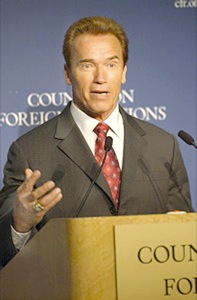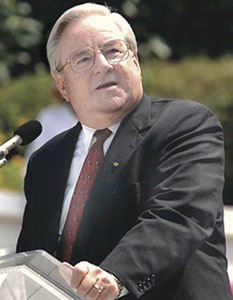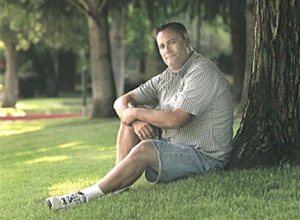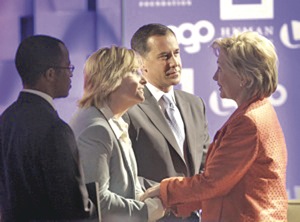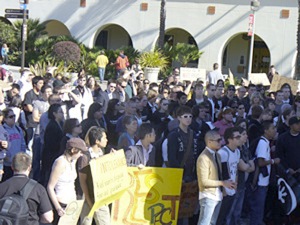feature
2007 Year in Review
Published Thursday, 27-Dec-2007 in issue 1044
Although there is some disagreement about how much legislative progress our community made this year, 2007 was certainly a banner year for GLBT visibility, locally, statewide and nationally.
In San Diego, the Superior Court, in January, swore in former Deputy District Attorney David Rubin as the first elected openly gay Superior Court judge in the County.
In February, Gov. Schwarzenegger confirmed that he would veto AB 43, the same-sex marriage bill introduced in April by the State Assembly. In October, ironically the same month he signed seven GLBT bills, he did so, and In Re Marriage Cases went to the Supreme Court, which received hundreds of amicus briefs supporting same-sex marriage. In June, state prisons became the first in the nation to allow conjugal visits for same-sex partners.
At the federal level, in October a revised Employment Non-Discrimination Act (ENDA) excluded transgender protection, despite the efforts of many GLBT activists to prevent the omission. “Don’t Ask, Don’t Tell” got a lot of press too, when retired Staff Sgt. Eric Fidelis Alva, the first Marine seriously injured in Iraq, in March, declared he was gay. Democratic U.S. presidential candidates subsequently announced a unified front on DADT’s repeal. Also in March, a fatal attack on Andrew Anthos, 72, spurred new legislation on hate crimes to include attacks on gays, but Congress dropped the proposed legislation in December. This year was also the first time in history that U.S. Democratic presidential candidates publicly debated GLBT issues, in a televised debate in August.
Here in the gayborhood, the closing of the 2200 Club in April was blockbuster news, as was, in August, the Superior Court’s ruling in favor of setting aside development on the controversial 301 University high rise. In September, the community celebrated Mayor Jerry Sanders’ change of heart on the same-sex marriage brief. The federal court’s ruling that a San Diego Roman Catholic diocese must pay $198 million to settle 144 abuse claims and the failure of Merck’s much-anticipated AIDS vaccine also set our heads spinning. But, in October, the wildfires ravaging the county brought out the best in us as we pooled our resources to help those in need.
Here are some of the top headlines from 2007:
Local bathhouse agrees to close in April
The 2200 Club negotiated with the city of San Diego and agreed to voluntarily cease operation on April 30, according to the bathhouse’s general manager, Charlie Sharples.
The sauna and steam club for men has been operating at its location at 2200 University Ave. in North Park for more than two years. Bob Smith and John Tennis Smith purchased the business in 2004.
Sharples, 2200 Club’s general manager for the last year and a half, said the decision to close in April was “strictly a business decision” and that the city has been targeting their business for quite some time.
“[The City Attorney’s Office was] going to just keep going after us,” he said. “Their intention was to close the club. So they announced they were going to bring criminal charges [and] they were going to send undercover agents in, so we decided the club wasn’t making enough money. It was a business decision.”
Deputy City Attorney Brian Ziegler said he could not comment about the negotiations with 2200 until the case is officially filed and made public record.
“We’ve been in the process of actively prosecuting this property for violations of the San Diego municipal code criminally, and we’re in the process of filing a civil complaint for red-light abatement action against the property for sexual activity that’s going on at the property,” he said.
Kehoe secures nondiscrimination policy for state military personnel
California Sen. Christine Kehoe, D-San Diego, announced Feb. 14 that the California National Guard will not discriminate against state guard members who are gay, lesbian or bisexual. The decision came following Kehoe’s request last fall to the California Military Reserve. In response, Major General William H. Wade II, commander of the California Military Reserve, issued a policy memorandum on the state’s commitment to nondiscrimination on the basis of sexual orientation.
The memorandum, dated Feb. 14, stated that nonfederal personnel who are lesbian, gay and bisexual will join other protected classes such as race, color, religion, nationality, gender, disability and age. According to the memo, “All leaders are responsible for ensuring that every member of the State Civil Service, State Military Reserve and State Active Duty who are not federally recognized receive fair and equitable treatment on the basis of their capability and merit without regard to race, color, religion, nationality, gender, disability, age or sexual orientation.”
“I’m impressed by the leadership of Major General Wade, who understands that qualified military personnel should never be discriminated against because of their sexual orientation,” Kehoe said.
The order does not apply to National Guard units in California who are federal employees. Federal guard members will continue to operate under the “Don’t Ask, Don’t Tell” policy, which has discharged more than 11,000 servicemembers because of their sexual orientation since the law’s inception in 1994.
Hillary Clinton pledges White House partnership with GLBT activists
WASHINGTON (AP) – Democrat Hillary Rodham Clinton told the nation’s leading gay rights group in an unpublicized speech that she wants a partnership with gays if elected president.
Clinton also said she opposes the “Don’t Ask, Don’t Tell” policy regarding gays in the military that was instituted during her husband’s presidency.
“I am proud to stand by your side,” Clinton said in a keynote speech March 2 to the Human Rights Campaign. Neither Clinton’s campaign nor her Senate office made any announcement that she would be making the Friday address.
Asked twice at a Monday campaign stop in Iowa why she did not publicize her speech to the group, Clinton said: “You’ll have to ask my campaign.”
In the speech, Clinton joked that she shares the same initials as the group, and pledged to maintain the same close working relationship that last year helped defeat the federal amendment that would have banned same-sex marriage.
“I want you to know that this is exactly the kind of partnership we will have when I am president,” Clinton told the group. “I want you to know that just as you always have an open door to my Senate office, you will always have an open door to the White House and together we can continue this journey.”
Assembly committee OKs same-sex marriage
SACRAMENTO (AP) – A state Assembly committee voted April 10 for a bill that would allow same-sex couples to marry, despite a veto threat and a continuing debate over the legislation’s constitutionality.
The Judiciary Committee approved the bill by Assemblymember Mark Leno, D-San Francisco, sending it to the Appropriations Committee, the last stop before the Assembly floor.
The 7-3 vote split along party lines, with Democrats backing the proposal and Republicans opposing it.
Lawmakers approved a nearly identical measure in 2005, but it was vetoed by Gov. Arnold Schwarzenegger. The governor argued that it violated Proposition 22, an anti-same-sex marriage initiative adopted by California voters in 2000.
The Republican governor told a group of high school students in February that he would turn down the bill again if it reached his desk this year. But Leno said lawmakers should keep trying.
“The time has come for California to honor its commitment to equality for all Californians by allowing each of our citizens the right to marry the person he or she loves,” he said.
The bill’s opponents, agreeing with Schwarzenegger, said the state constitution prevents the Legislature from authorizing same-sex marriages unless voters first overturn Proposition 22.
Stabbing at Sunburst Housing Project prompts The Center to offer counseling
A 24-year-old resident of The Center’s Youth Housing Project in East Village was hospitalized with a serious chest wound after a confrontation inside his apartment escalated, resulting in his stabbing at about 5:15 p.m. May 7, San Diego police said.
SDPD Lt. Ken Stewart described the suspect as a Latino male, between 17 and 20, 5 feet 7 inches, wearing tan pants and a white shirt with blue pin stripes.
“It appears that the victim and the suspect were acquainted in some way and were not strangers, and somehow a dispute turned into a fight and then into a stabbing,” said SDPD Lt. Ken Stewart. “After the suspect stabbed the victim, causing serious chest injuries, he then ran out of the building and hopped onto a bus, fleeing the area.”
According to both law enforcement and officials from The Center, the stabbing was the first violent crime at the Sunburst Housing Project. The first housing facility for GLBT youth in the San Diego area, Sunburst Housing Project houses 23 formerly homeless 18- to 24-year-olds who meet income and other criteria. The facility has a resident property manager, along with case managers and social workers who offer social services and guidance to residents.
At the time of the stabbing, the property manager was on the site, but other staff members were at an off-site meeting and responded by the time police arrived.
The night after the stabbing, the housing project held a meeting for Sunburst residents, and participants had mixed reaction to the incident. Some residents expressed fear over the incident, while others said that this situation is normal and didn’t bother them too much, given where they come from and past living arrangements, Jacobs said.
Television evangelist Falwell dies at 73
LYNCHBURG, Va. (AP) – The Rev. Jerry Falwell, the folksy, small-town preacher who used the power of television to found Moral Majority and turn the Christian right into a mighty force in American politics during the Reagan years, died May 15 at 73. Falwell was discovered without a pulse in his office at Liberty University and pronounced dead at a hospital an hour later. Dr. Carl Moore, Falwell’s physician, said he had a heart condition and presumably died of a heart rhythm abnormality.
Driven into politics by the 1973 Supreme Court ruling that established the right to an abortion, Falwell founded Moral Majority in 1979. One of the conservative lobbying group’s greatest triumphs came just a year later, when Ronald Reagan was elected president.
Falwell credited Moral Majority with getting millions of conservative voters registered, aiding in Reagan’s victory and giving Republicans control of the Senate.
“I shudder to think where the country would be right now if the religious right had not evolved,” he said when he stepped down as Moral Majority president in 1987.
The rise of Christian conservatism – and Moral Majority’s full-throated condemnation of homosexuality, abortion and pornography – made Falwell perhaps the most recognizable figure on the evangelical right, and one of the most controversial ones, too.
Over the years, Falwell waged a landmark libel case against Hustler magazine founder Larry Flynt over a raunchy parody ad, and created a furor in 1999 when one of his publications suggested that the purse-carrying “Teletubbies” character Tinky Winky was gay.
Matt Foreman, executive director of the National Gay and Lesbian Task Force, extended condolences to those close to Falwell, but added: “Unfortunately, we will always remember him as a founder and leader of America’s anti-gay industry, someone who exacerbated the nation’s appalling response to the onslaught of the AIDS epidemic, someone who demonized and vilified us for political gain and someone who used religion to divide rather than unite our nation.”
California prisons allow conjugal visits for same-sex partners
SACRAMENTO, Calif. (AP) – California began allowing overnight visits for same-sex partners of prison inmates to conform to the state’s domestic partnership law.
California is one of just six U.S. states that allow overnight family visits, which take place in trailers or other housing on prison grounds. But attorneys, gay rights advocates and corrections officials said they know of no other state that permits conjugal visits by same-sex partners.
“Historically, these types of requests were denied,” said Terry Thornton, a spokesperson for the California Department of Corrections and Rehabilitation. “Homosexuality is a touchy subject in prison. We don’t want people to come to harm in prisons, but we need to comply with the law.”
Since the 1970s, immediate family members have been able to visit many prison inmates for up to three days at a time.
The privilege is being expanded to registered domestic partners under a law signed by former Gov. Gray Davis that took effect in 2005. It requires state agencies to give the same rights to domestic partners that heterosexual couples receive.
“This was one of the issues raised at the time. It’s unfortunate that it’s taken the Department of Corrections so long to comply with the law,” said Geoffrey Kors, executive director of Equality California.
San Diego Pride director responds to Set Free Ministries’ protest/breach of contract at Petco Park
In early July, San Diego Pride executive director Ron deHarte gave an official response to Set Free Ministries’ breach of contract with Petco Park and its protest of San Diego Prides’ “Out at the Park.”
“San Diego LGBT Pride believes the upcoming ballgame this Sunday is the wrong venue for an anti-gay protest, which blatantly attacks a friendly association that Pride has made with the San Diego Padres to present a game that commemorates LGBT baseball fans and the many supporters of our annual Pride celebration,” deHarte said.
“Out at the Park” at Petco Park was one of several pre-Pride events leading up to 2007 San Diego Pride. San Diego Pride purchased 1,000 tickets to the game and advertised the event as “Out at the Park.” The Gay Men’s Chorus of San Diego sang the national anthem.
Set Free Ministries, an El Cajon-based organization that ministers to the homeless, ex-convicts and drug addicts, had hoped to turn the July 8 San Diego Padres game against the Atlanta Braves at Petco Park into a “disruptive and hateful protest aimed directly at gay and lesbian fans who will be in attendance,” deHarte said.
Although Set Free Ministries did not return phone calls from the Gay & Lesbian Times, it told the San Diego Union-Tribune that it was upset because the 1,000 GLBT fans were attending the game on the same night that children 14 and under were to be given a free floppy hat as part of a Padres’ promotion for kids. Set Free said it felt that San Diego Pride shouldn’t be allowed to have a group at a game while the Padres try to recruit underage fans.
Set Free’s approximately 75 anti-gay protestors wore red T-shirts with “Save Our Kids” and “Protesting Gay Group Buying Tickets On Kids Day” emblazoned on them. They carried signs that read “Homo Sex Is Sin,” cited Bible verses and handed flyers to fans at the gate, where “ex-gay” City Council candidate James Hartline encouraged people to turn around and go home.
Set Free walked out on its contract to fill 42 concession jobs for the Padres’ July 8 game.
The ministry lost $1,680 (5 percent of its monthly budget) by walking out.
Court rules in favor of Friends of San Diego in 301 University case
A Superior Court judge ruled Aug. 23 that the City of San Diego conducted inadequate reviews in last year’s approval of a proposed 12-story condominium and retail project in Hillcrest.
Ruling in a suit filed in October, 2006 by Friends of San Diego, opponents of the proposed high-rise at 301 University Ave., Judge Linda Quinn voided the City Council’s September 2006 approval of the project.
The court said that the City of San Diego did not follow legal requirements in the preparation of an Environmental Impact Report (EIR), that 301 University would have a severe impact on the neighborhood, that a proper traffic analysis was not done, that 301 ignored serious community park shortages, that the city did not analyze the impact of construction or cumulative effects on the neighborhood and that the public alley should not have been sold to a developer.
The city is the party responsible for conducting appropriate reviews prior to project approval, but now that the court has ruled it did not do so, developer La Jolla Pacific Development will need to work with the city and its environmental consultants to move forward. The process will take at least six to eight months, according to developers.
Bruce Leidenberger, the firm’s president said it has “followed the rules and requests of the city to date. The judge ruled that the city has to clean it up in order to move forward, and that’s what we’re going to do in order to follow through with this project.”
The project has received intense scrutiny since developers initially proposed it more than three years ago.
“Our community plan says that projects must fit with the height scale and bulk of the existing neighborhood,” said Tom Mullaney, leader of Friends of San Diego, which brought the lawsuit, and a local business owner. “The height of 147 clearly doesn’t fit with the existing one- and two-story buildings. The bulk of this project was going to be a massive project covering all the way from Third to Fourth Avenue. So it was going to present a monolithic appearance across our skinny little University Avenue.”
The developer’s current plan includes a 10,250-square-foot retail space, containing a 1,300-square-foot gym, a public terrace and 96 one- to three-bedroom condominiums. The $65 million project would also provide three levels of aboveground residential parking and 121 underground public parking spaces on two levels.
Democratic presidential candidates address GLBT rights in television forum
LOS ANGELES (AP) – Democratic presidential contenders Aug. 9 sought to underscore their differences with Republicans on GLBT rights, but leading candidates also faced sharp questions on their reluctance to embrace marriage for same-sex couples.
In a forum focusing on GLBT issues sponsored by a gay rights organization and aired on a gay-oriented cable channel, Sen. Barack Obama argued that civil unions for same-sex couples wouldn’t be a “lesser thing” than marriage. He disputed that his position on same-sex marriage made him a vestige of the past rather than an agent of change.
Obama belongs to the United Church of Christ, which supports same-sex marriage, but Obama has yet to go that far.
“If we have a situation in which civil unions are fully enforced, are widely recognized, people have civil rights under the law, then my sense is that’s enormous progress,” the Illinois Democrat said.
New Mexico Gov. Bill Richardson said the nation was on “a path to full inclusion” but added, “In my judgment, what is achievable is civil unions with full marriage rights.”
New York Sen. Hillary Rodham Clinton echoed support for civil unions. “I will be a president who will fight for you,” she said.
But she also said she made a mistake in March when she steered around a question on whether homosexuality was immoral. She was asked about it at the time after Gen. Peter Pace, chair of the Joint Chiefs of Staff, said he considered homosexual acts immoral and similar to adultery. He later said he should have not expressed his personal views. Clinton later issued a statement saying she did not think being gay was immoral.
“It was a mistake,” Clinton said. “I should have put it in a broader context.”
Six of the eight Democratic candidates answered questions at an event described as a milestone by organizers. It marked the first time that major presidential candidates appeared on TV specifically to address gay issues, organizers said.
Marriage lawsuit advances in California Supreme Court
SAN FRANCISCO – In briefs filed Friday with the California Supreme Court, the National Center for Lesbian Rights, Lambda Legal, and the American Civil Liberties Union (ACLU) argue that California violates its own constitution by denying same-sex couples the freedom to marry.
“Anything less than marriage leaves lesbian and gay couples in a confusing and discriminatory twilight zone,” said Lambda Legal Senior Counsel Jennifer C. Pizer. “We know this because we answer the distress calls every day – calls that began with the first statewide domestic partner bill in 1999 and haven’t slowed as the law broadened over the years. To the contrary, the distress calls have increased as more couples register, hoping to shield their families, and encounter inconsistent, incomplete protections.
We’ve welcomed the Supreme Court’s invitation to explain how far domestic partnerships fall short of full marriage.”
San Diego, Frye vote no on supporting same-sex marriage brief
Many members of the GLBT community were stunned Sept. 4 by the surprise vote of District 6 Councilmember Donna Frye against the city adding its name to sign a friend-of-the-court brief in an appeal to the California Supreme Court about the denial of marriage licenses to same-sex couples.
As a result, the City Council vote was tied at 4-4, and no action was taken. The motion needed five votes to be approved. District 3 Councilmember Toni Atkins asked the Council to sign the amicus curiae (friend-of-the-court). Voting with Atkins were Councilmembers Jim Madaffer, Scott Peters, and Ben Hueso.
Frye joined Councilmembers Kevin Faulconer, Tony Young, and Brian Maienschein in voting against the city getting involved in the case that originated in San Francisco. The mayor of San Francisco, Gavin Newsom, issued marriage licenses to same-sex couples in 2004, but the state Supreme Court halted that practice and later invited input to resolve the constitutional issues involved with issuing same-sex marriage licenses.
“After all we did for Donna Frye,” said Charles McKain, afterwards. “What’s wrong with her?”
Longtime activist Gloria Johnson wept, as did others as they filed out of council chambers Tuesday afternoon.
James Hartline, an ex-gay activist who says he is no longer homosexual, led a group of people to oppose the city filing a friend-of-the-court brief. His Web site claimed it was “the most dangerous attack on Christian values to ever come before the San Diego City Council” and described same-sex marriage as “an evil act.”
Afterwards, Hartline told his followers: “It’s over for now. We’re done. We won.”
Hours later, Frye told the Gay & Lesbian Times why she voted against the motion.
“It was not a proper process. That’s why I voted against it,” said Frye, adding that the public had too little time to even know about the debate that day.
“If they bring it back, I’ll vote for it,” said Frye to a reporter.
The item was redocketed for Sept. 18.
Sanders signs San Diego resolution to become a ‘friend of the court’
Mayor Jerry Sanders changed course Sept. 19, announcing he would sign the resolution to approve the San Diego City Council’s 5-3 vote to become a friend of the court in an appeal of a same-sex marriage license ban to the California Supreme Court.
The mayor, who Tuesday pledged to veto the council’s vote, explained his position at a press conference Wednesday afternoon.
“I have decided to lead with my heart – to do what I think is right – and to take a stand on behalf of equality and social justice,” he said. “The right thing for me to do is sign this resolution. … The concept of a ‘separate but equal’ institution is not something that I can support.”
During Sanders’ mayoral campaign, he said he did not support same-sex marriage. Instead, he supported civil unions and domestic partnership.
“I have close family members and friends who are members of the gay and lesbian community,” Sanders said. “These folks include my daughter Lisa and her partner, as well as members of my personal staff. I want for them the same thing that we want for all our loved ones – for each of them to find a mate whom they love deeply and who loves them back; someone with whom they can grow old together and share life’s wondrous adventures. And I want their relationships to be protected equally under the law.
“In the end, I could not look any of them in the face and tell them that their relationships – their very lives – were any less meaningful than the marriage I share with my wife Rana.”
After hours of testimony from both sides, the San Diego City Council voted 5-3 to add the city’s name to the list of other cities that filed a friend-of-the-court brief to the California Supreme Court in an appeal of the ban on marriage licenses for same-sex couples in San Francisco.
Councilmember Donna Frye switched her vote from her Sept. 4 vote, when she voted against it, and she seconded the motion by District 3 Councilmember Toni Atkins. Councilmembers Scott Peters, Jim Madaffer, and Ben Hueso also voted in favor, while Councilmembers Kevin Faulconer, Tony Young, and Brian Maienschein voted against. Faulconer, Young and Maienschein also voted against filing the brief on Sept. 4. They didn’t give a reason for their vote.
Governor signs seven GLBT bills, including Kehoe’s tax relief legislation
Gov. Arnold Schwarzenegger signed 97 bills and vetoed 58 last week, including AB 43, legislation that would have given same-sex couples the right to marry.
Schwarzenegger, however, signed seven bills protecting GLBT people including Sen. Christine Kehoe’s, D-San Diego, legislation – Senate Bill 559, which provides relief to registered domestic partners who paid discriminatory property taxes before 2006.
The new law reverses the tax increase assessed to couples who separated or whose partners died and whose property changed hands before a 2006 law went into effect protecting them against unfair property reassessments. Property is not reassessed when real estate transfers between married spouses.
Kehoe said the new law closes the loophole the 2006 law created.
“Domestic partners who built a home together should not be squeezed by property taxes any more than other loving families,” Kehoe said. “These committed couples should not be penalized simply because one of them dies or the partnership ends.
“When people are being treated unfairly, it’s a perfect example of how unfair our lack of civil rights is.”
Kehoe also authored a resolution passed by the legislature not requiring the governor’s signature that calls on the federal government to recall the military’s “Don’t Ask, Don’t Tell” policy.
“San Diego is home to thousands of active duty and retired military LGBT service members, and ‘Don’t Ask, Don’t Tell’ is a huge disservice to our military personnel,” said Kehoe. “It forces them to serve in silence, not live in truth, and it damages morale. It would be best if they could serve openly.”
Kehoe said the resolution puts the California Senate on record as opposing “Don’t Ask, Don’t Tell” and may aid Congressmembers who seek to overturn the policy.
A second resolution, also passed by the legislature and not requiring Schwarzenegger’s signature, authored by Mike Eng, D-Monterey Park, asks Congress and the president to strengthen the nation’s hate crimes law to include sexual orientation, gender identity and disability.
GLBT community responds to fire victims’ needs
Rubber Rose Boutique and Community Gallery, a lesbian-owned-and-operated sexuality boutique and community space in North Park, in coalition with two immigrant and Latino rights organizations, began collecting donations for migrant workers displaced by the recent San Diego fires.
“We wanted to, one, offer something back to the community but also help the community facilitate that as well. So the day that word came back that the fire had just started up, we kind of sent the word out to all of our customers to give them some kind of outlet to help,” said Carly Delso-Saavedra, co-owner of the Rubber Rose Boutique.
Donations are going to migrant workers and displaced farm workers, who are one of the groups hardest hit by the San Diego fires, said Enrique Morones, founder of Border Angels, whose main mission is to prevent the deaths of immigrants traveling through border areas by assisting them with basic human resources such as food, water and clothing.
Rubber Rose gives donations to Border Angels and the San Diego County Chapter of the Mexican American Political Association (MAPA), an organization that fights for the political representation and constitutional protections of Mexican and Hispanic Americans.
Rise in hate crimes reported locally, nationally
The Federal Bureau of Investigation (FBI) reported Nov. 19 that hate crimes rose 25 percent in San Diego city and 32 percent in San Diego County in 2006. Sexual orientation bias was the leading motivation for hate crime in the city, while assaults prompted by racial hatred led in the county.
The statistics “can be interpreted in various ways,” said Deputy District Attorney Oscar Garcia, who specializes in hate-crime prosecutions. “I don’t place full weight on the stats. I think they’re only a guide to us to help us look at what’s happening in the community. For example, FBI statistics don’t include all jurisdictions. It’s voluntary.”
Garcia said, however, that the FBI report is consistent with what he sees on the job. “I’ve been in this assignment for the last year and a half, and I’ve seen [hate crimes motivated by sexual orientation and ethnic bias] rise.”
According to a recent article in The San Diego Union-Tribune, the San Diego Police Department (SDPD) reported 55 hate crimes in 2006, compared with 41 in 2005, and the county Sherriff’s Department reported 31, up from 21 the previous year.
San Diego Assistant Police Chief Bill Maheu says that rise is likely caused by at least two factors: “We’re more sensitive to the issue. We realize that hate crimes are something that affect the whole community,” he said.
Yet while Maheu says people are less reluctant to report hate crimes because society now supports doing so with laws and sentencing, he adds the rise also likely indicates an actual increase in hate crimes.
Nationally, the FBI reports, hate crimes rose 8 percent last year.
Student attacked on SDSU campus just hours after rally against hate
What is being investigated by authorities as a hate-driven attack rattled the San Diego State University GLBT community on Dec. 3. The incident, which occurred just hours after a rally in which students, faculty and administration gathered to speak out against hate, comes on the heels of a number of hate-related incidents on campus.
The attack, on a 23-year-old female student, occurred on Dec. 3 at approximately 7 p.m., near the Villa Alvarado apartments on Alvarado Avenue.
The male perpetrator, sprung from behind the victim – described only as a GLBT ally and prominent member of the student body – choking her with a rope and blurting the words “faggot lover.” As the victim attempted to ward off the attacker, he threw her to the ground, fleeing the scene before the female could clearly identify him, authorities said.
Earlier in the day, the victim had attended The Rally Against Hate, spearheaded by the LGBT Resource Center and several other groups on campus in response to a threatening letter in the alternative student-run newspaper, The Koala, which had attacked an openly gay SDSU administrator.
A rash of anti-gay incidents that have occurred recently at SDSU included the theft of a student organization’s rainbow flag displayed at the student union – the third time in four years that such a theft has occurred – and the pelting of students with eggs during an off-campus rally in support of same-sex marriage.
San Diego State Police, along with San Diego city law enforcements officials are investigating the most recent attack.
Congress drops hate crimes from Department of Defense bill
The Associated Press – Congress has dropped legislation that would have expanded hate crime laws to include attacks on gays after it became clear the measure wouldn’t pass the House, aides said Dec. 6.
The bill, sponsored by Sen. Edward Kennedy, was widely supported by Democrats and even some moderate Senate Republicans. But because it was attached to a major Department of Defense policy bill that would have authorized more money for the Iraq war, many anti-war Democrats said they would oppose it.
“We don’t have the votes,” said one House Democratic aide, who spoke on condition of anonymity because conference negotiations on the defense bill were ongoing. “We’re about 40 votes short, not four or six.”
The development was a blow to civil rights groups which say that broadening federal laws are necessary to address a rise in crimes motivated by hate based upon a person’s sexual orientation or gender identity.
Under current federal law, hate crimes include acts of violence against individuals on the basis of race, religion, color or national origin. Federal prosecutors have jurisdiction only if the victim is engaged in a specific federally protected activity such as voting.
Kennedy’s bill would have extended the category to include sexual orientation, gender, gender identity or disability. It also would give federal authorities greater leeway to participate in hate crime investigations, and allow them to step in if local authorities were unwilling or unable to act.
The bill is named for Matthew Shepard, a gay college freshman who died after he was beaten into a coma in 1998 in Laramie, Wyo.
While Democratic leaders said they supported the bill, the bundled package posed too high a hurdle. A substantial number of liberal House members routinely vote against the annual defense bill because of the billions it authorizes in combat operations and for programs such as missile defense.
At the same time, some conservative Democrats and Republicans said they would oppose the legislation if the hate crimes provisions were attached – either because they don’t think hate crimes laws should be changed or because they don’t think the issue should be tied to a bill for the troops.
|
|
Copyright © 2003-2025 Uptown Publications

